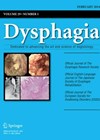You searched for "dysphagia"
Impact of lingual pumping in Parkinson’s patients with dysphagia
Dysphagia in Parkinson’s disease (PD) is one of the most important causes of mortality in these patients. Swallowing difficulty in Parkinson’s disease is associated with lingual pumping or festination, anterior escape, premature loss of bolus, oral and pharyngeal retention, multiple...What characterises dysphagia in unilateral vocal fold impairment?
5 July 2022
| Roganie Govender
|
ENTA - Laryngology / Swallowing / Voice
|
Dysphagia, Pathophysiology, Quantitative measures, Unilateral vocal fold immobility, Videofluoroscopic swallow studies
The closure of the vocal folds during swallowing is known to contribute to airway protection along with epiglottic inversion and closure of the false vocal folds. It is therefore plausible to expect that unilateral vocal fold impairment without complete closure...
Swallow this: management of dysphagia in progressive neurological conditions
1 November 2019
| Anna Volkmer
|
Otology
Whether the person with the swallowing difficulty has an acquired or progressive neurological condition, understanding the aetiology will allow the speech and language therapist assessing the swallow to have a better understanding of the likely implications for future swallow management...
Surgically improving pharyngeal paralysis and associated dysphagia
1 November 2016
| Suzanne Jervis
This was an interesting article explaining the current methods used to try and improve dysphagia and in some cases associated problematic aspiration following vagal injury. These patients are often those with other associated cranial neuropathies, with skull base lesions, brain...
Association between dysphagia and sarcopenia: implications for assessment of older people
4 May 2021
| Roganie Govender
|
ENTA - Laryngology / Swallowing / Voice
|
Deglutition, Deglutition disorders, Dependency, Depression, Dysphagia, Sarcopenia
The onset of swallowing difficulties with progressive age is reported to occur in 13-35% of the elderly population. Sarcopenia is characterised by a decrease in muscle mass, strength and function. Sarcopenic dysphagia is a relatively new term. Its prevalence is...
Going online with dysphagia practice: potential for innovation post pandemic
10 March 2023
| Roganie Govender
|
ENTA - Laryngology / Swallowing / Voice, COVID-19
|
Dysphagia, Feeding disorders, Speech language pathology, Telepractice
Telepractice is perhaps the most widespread service innovation to have received such rapid uptake across health systems globally. Disciplines that started to adopt telehealth prior to the pandemic found themselves at the forefront of a seismic shift to delivering healthcare...
COVID-19 and dysphagia in critically ill patients: a reflection of some findings
Dysphagia was a common occurrence in patients admitted to intensive care units (ITU) during the pandemic. This paper explores data from 26 ITUs over 12 months during 2020-2021. Findings from 235 patients admitted with Delta and subsequent Covid variants who...Do certain chronic medications increase dysphagia in older people?
1 January 2017
| Roganie Govender
|
Acute geriatric unit, Aged, Deglutition, Deglutition disorders, Drugs, Medication
Oropharyngeal dysphagia is known to affect a high number of older people in the community, in care homes and in acute geriatric admissions to hospital. The authors of this study have recognised that many older people take drugs for chronic...
Oesophageal atresia and trachea-oesophageal fistula: a perspective on dysphagia management from Turkey
5 November 2021
| Roganie Govender
|
ENTA - Laryngology / Swallowing / Voice
|
Deglutition, Deglutition disorders, Dysphagia management, Esophageal atresia, Knowledge
Children born with oesophageal atresia with or without trachea-oesophageal fistula usually receive early surgical repair to create tension-free anastomosis that facilitates oral feeding. However, many children are at risk of problems related to subsequent dysphagia. This includes respiratory, nutritional, motility...
Can prediction models help identify dysphagia in ventilated patients?
3 May 2024
| Gemma Clunie
|
ENTA - Laryngology / Swallowing / Voice
Dysphagia commonly affects patients in intensive care units (ICU), particularly those on mechanical ventilation, and is associated with high risk of mortality. This systematic review and meta-analysis aimed to identify predictors for dysphagia in ventilated ICU patients by summarising existing...
Risky behaviour: do care homes follow dysphagia recommendations?
5 November 2021
| Anna Volkmer
|
ENTA - Speech and Language Therapy
|
aged care, barriers, dysphagia, rural, speech-language pathology, texture-modified diets
A huge proportion of elderly people living in residential care homes will develop dysphagia. In Australia this is estimated at close to two thirds of all residents. It is the role of the speech and language therapist to make recommendations...
Elevated prevalence of late-onset dysphagia among head and neck cancer survivors and identifying risk factors
7 January 2020
| Richard (Wei Chern) Gan
|
ENTA - Head & Neck
|
dysphagia, head and neck cancer, late effects, squamous cell carcinoma, survivorship
Dysphagia is one of the most common problems affecting head and neck cancer (HNC) survivors. There are few studies investigating late-onset dysphagia post-treatment. The authors set out to investigate the prevalence of dysphagia-related diagnoses and procedures five years’ post-treatment, changes...















